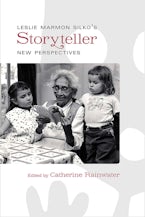- Home
- literary criticism
- Louis Owens
Louis Owens
Writing Land and Legacy
Edited by Joe Lockard and A. Robert Lee
Published by: University of New Mexico Press
Louis Owens: Writing Land and Legacy explores the wide-ranging oeuvre of this seminal author, examining Owens's work and his importance in literature and Native studies. Of Choctaw, Cherokee, and Irish American descent, Owens's work includes mysteries, novels, literary scholarship, and autobiographical essays. Louis Owens offers a critical introduction and thirteen essays arranged into three sections: "Owens and the World," "Owens and California," and "The Novels." The essays present an excellent assessment of Owens's literary legacy, noting his contributions to American literature, ethnic literature, and Native American literature and highlighting his contributions to a variety of theories and genres. The collection concludes with a coda of personal poetic reflections on Owens by Diane Glancy and Kimberly Blaeser. Libraries, students, scholars, and the general public interested in Native American literature and the landscape of contemporary US literature will welcome this reflective volume that analyzes a vast range of Louis Owens's imaginative fictions, personal accounts, and critical work.
Joe Lockard is an associate professor of English at Arizona State University. He is the author of Watching Slavery: Witness Texts and Travel Reports and the coeditor of Prison Pedagogies: Learning and Teaching with Imprisoned Writers.
A. Robert Lee is professor of American literature at Nihon University, Tokyo.
"At its best, this collection places Owens in meaningful relation to Indigenous literary-field formation while also directing us to his interventions in US literary history."--Susan Bernardin, Transmotion
"An astute and major accomplishment. . . . Highly recommended."--R. Welburn, Choice
"Louis Owens: Writing Land and Legacy offers the first comprehensive study of the entirety of Owens's work, from his literary scholarship to his autobiographical essays to his novels. Placing him in transnational contexts, the authors trace Owens's contributions to Native American literature, specifically, and to American literature, generally. Noting Owens's focus on memory, land, and mixed-blood experience, they explore his intertextuality, anti-coloniality, and indigenization in the mystery novel, eco-criticism, modernism, and transnational American studies."--Hertha D. Sweet Wong, author of Picturing Identity: Contemporary American Autobiography in Image and Text
"This outstanding collection does the urgent and necessary work of bringing Louis Owens out of the scholarly shadows, recentering his achievement within the traditions of American literature and Native American literature alike."--Deborah L. Madsen, editor of The Routledge Companion to Native American Literature
Acknowledgments
Introduction. Stories Mainly True
Joe Lockard and A. Robert Lee
Part One. Owens and the World
Chapter One. Memory Theatre: Louis Owens's Narratives of Remembering
A. Robert Lee
Chapter Two. Louis Owens and Anti-Colonial Ghost Dances
Joe Lockard
Chapter Three. Rethinking Wilderness: Louis Owens's Wounded Landscapes and Eco-Gothic Specters
Paul Whitehouse
Part Two. Owens and California
Chapter Four. Louis Owens: Haunting California
Chris LaLonde
Chapter Five. Louis Owens, California, and Indigenous Modernism
David Carlson
Chapter Six. Reading Steinbeck, Reading California: Tracing the Development of Louis Owens's Postindian Aesthetics
Billy J. Stratton
Part Three. The Novels
Chapter Seven. Louis Owens's Wolfsong and Ken Kesey's Sometimes a Great Notion in the Anthropocene Age
James Mackay
Chapter Eight. Literary Form and the Mythic Underpinnings of Louis Owens's The Sharpest Sight
Alan R. Velie
Chapter Nine. "Eran Muy Crueles": Requirements of Madness in Louis Owens's Bone Game
David Moore
Chapter Ten. "The Past Was a White Man's Illusion": The Temporal Continuum and Trans/Nationalism in Louis Owens's Nightland and Dark River
Birgit Däwes
Chapter Eleven. Nightland--No Country for Old Men? Louis Owens and Cormac McCarthy at Postmodern High Noon
Cathy Covell Waegner
Chapter Twelve. "Like a Clown Shot Out of a Cannon": Humor in Louis Owens's Nightland
Joseph Coulombe
Chapter Thirteen. "Jake Nashoba Went Home": Tribal Citizenship, Belonging, and Naturalization in Louis Owens's Dark River
John Gamber
Part Four. Coda
Chapter Fourteen. Letter to Louis
Diane Glancy
Chapter Fifteen. Of Nalusachito and the Course of Rivers
Kimberly Blaeser
Contributors
Index










